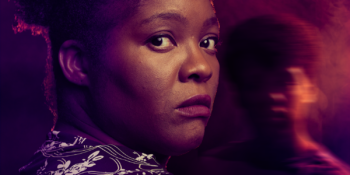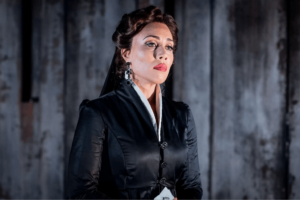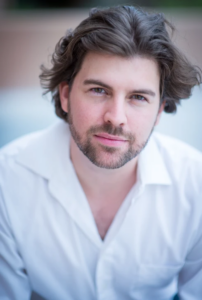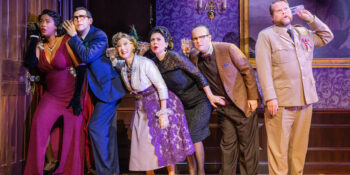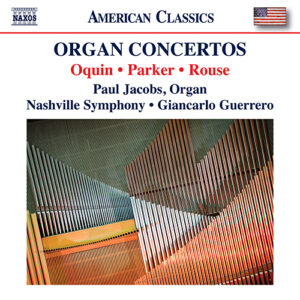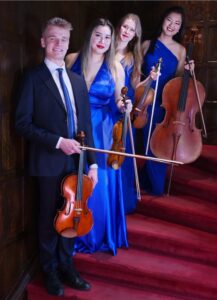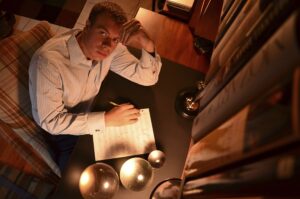As You Like It

The Nashville Shakespeare Festival performed As You Like It for their very first show in 1988. As Executive Artistic Director Denice Hicks says in her program notes, she was in the audience and “fell in love with the spirited, free, outdoor production… and now I will close out my tenure with the same romantic musical comedy that captured my heart that lifetime ago.”
Shakespeare’s plays have survived the English Civil War, the American Revolution, the American Civil War, and two World Wars (just to name a few). The joyful timelessness of As You Like It reminds us that there is more to life than stressful election years, and that laughter and comedy often reveal as many profound truths about human nature as tragedies do.

This play is a pastoral comedy Shakespeare probably wrote in 1599, around the same time as Julius Caesar. While I’m a fan of “an honorable man,” As You Like It is a lot more fun, which is probably why it’s one of his most frequently performed comedies. Like many of his comedies, this one involves disguise: after the usurping Duke Frederick banishes his daughter’s Celia’s best friend Rosalind, the two young women run away together, Rosalind disguised as a man. They hide in the forest of Arden, to which Orlando, the man Rosalind is in love with, has also fled to avoid being killed by his brother. Confusion, love, and flirting abounds and it all ends happily. This play has probably one of the most straightforward Shakespeare plots and this performance is not much longer than two hours, including the fifteen-minute intermission.
I attended the September 7th performance at OneC1TY, which was a Saturday night with perfect weather: 70 degrees when we arrived, there was a light breeze and I was able to wear a jacket comfortably for the duration of the performance (always check the forecast before attending and bring a hoodie). My friends and I sat at the back, on the low metal bleachers which provide a view over the lawn chairs and blankets of the audience closer to the stage. We forgot to bring any sort of cushion, so if you’re going to sit on the bleachers, plan accordingly.
There are food trucks and a well-stocked concession stand as well as drinks. We saw several people with the Yazoo Shake’s Beer, a delicious lager made specifically for the Nashville Shakespeare Festival. The bathrooms, or “Posh Privies,” are as convenient, clean, and posh as ever. Convenient and free garage parking is directly beside the venue, with clear signs directing drivers where to go.
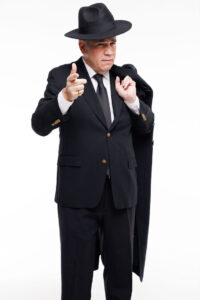
Director Cammy Harris’s choice to set the play in 1950’s America is fun, providing for a variety of costumes and for a great musical beginning. The tyrant Duke Frederick sings a number on stage with a cigarette in hand, the image of a mobster crooner, while Celia and Rosalind sing backup. The mobster vibes mesh with his illegitimate power and this is added to by a bit of comedy: an actress planted in the audience pretends to film the set on her phone and is chased off by some of his thugs. What a smooth way to combine the character, the setting, and an audience reminder all in one!
Music is used frequently in this production, more diegetic than not. Often it is used to introduce a new scene, with the character appearing on stage with an acoustic guitar. One such moment gave Orlando (Gerold Oliver) a chance to demonstrate his improv skills. He came down the aisle singing and playing just as a woman attempted to dart out from her seat. Without halting his stride Oliver casually said “How ya doing” as she passed him, making everyone laugh.
As You Like It doesn’t restrict its comedy to witty dialogue but also has action: the hero Orlando fights an established wrestler in a match at Duke Frederick’s court. That scene serves as the moment that he and Rosalind fall in love at first sight, but it is also a moment for Josh Kiev to shine as his opponent Charles. Kiev hams the moment up delightfully, posturing like he’s in the WWE. Since stage wrestling between actors wearing fragile microphones already restricts the realism of physical combat, it’s clever to make the match as staged as possible.
My only critique of the show is that Duke Senior is played by a woman (Denice Hicks), but they don’t change her title to Duchess, despite referring to the character as “mother” and “she.” Actors playing characters of another gender has always been part of the Shakespearean tradition and is common for the Nashville Shakespeare Festival. Here I just wish they had done it more consistently: since there’s already another duke and they talk about the two in relation to each other, the inconsistent gendering of the role makes it more confusing at times than it needs to be.
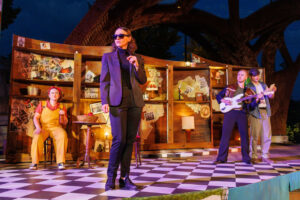
Bethany Dinkel’s costumes are great, using looks from a variety of 1950’s social strata. One costume adds a lot of humor to the character: Jacques is a comic relief, a pretentious pseudo-intellectual in the banished Duke Senior’s court. Dinkel chose a beatnik outfit for this character, making a host of comic mannerisms available to Elyse Dawson’s portrayal.
The cast is excellent and has great chemistry with each other, especially Gerold Oliver (Orlando) and Dani Grace Nissen (Rosalind). They are charming and have such hopeful energy that you don’t even mind them falling in love at first sight, and their scenes of extensive flirting are very cute. Kate Drury does a fantastic job as the best friend Celia, teasing and supporting Rosalind as only a close friend of years could. Galen Fott owns the mobster singer role of Duke Frederick, giving him a layer of show business grime that adds to the character. Denice Hicks is authentic and likeable as Duke Senior, cheerful and uncomplaining in her rural banishment.

AG Williams gets a lot of laughs as Touchstone, and even small roles like that of Adam (played by Alan Lee) and Charles (the wrestler mentioned above, played by Josh Kiev) shine with moral strength and ostentatious ego, respectively.
The happy ending is given oomph with a musical number sung by the whole cast, The Monkees’ “I’m a Believer.” The night I attended a large part of the crowd joined in the dancing, giving us all a burst of energy.
This season’s Summer Shakespeare is Denice Hicks’ final as Executive Artistic Director for the Nashville Shakespeare Festival, after decades of service developing it into what it is today. To quote As You Like It,
“All the world’s a stage, And all the men and women merely players;They have their exits and their entrances; And one man in his time plays many parts…”
We look forward to seeing what future roles Denice Hicks will play in Nashville’s theater community. Thank you for more than thirty years of enriching our local arts scene!
The Nashville Shakespeare Company will continue their Summer Shakespeare at OneC1TY and Franklin’s Academy Park until September 29. For more information, see Summer Shakespeare 2024.
Next to Normal: a Compelling Depiction of Mental Illness
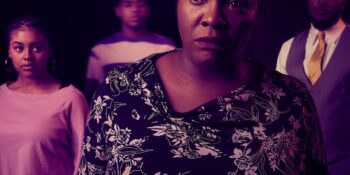
On September 5th, I was able to see the final dress rehearsal of Street Theatre Company’s production of the musical Next to Normal. In the intimate black box of the Barbershop Theater we sat only a few feet away from the six actors, able to witness every nuanced facial expression. Before the play began, the director, Alicia Haymer, spoke for a moment and reminded us that it was perfectly alright to emote and that actors live off of feedback. Thank goodness for that, because I cried (and laughed) multiple times during the performance.
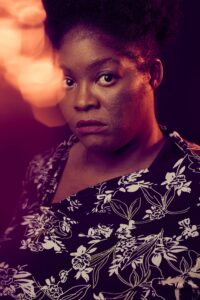
Next to Normal follows the struggle of a mother and wife, Diana Goodman (Jennifer Whitcomb-Oliva), with mental illness and the effect of the illness on her whole family. In the second act, Diana undergoes electroconvulsive therapy (ECT) in hopes of getting better. It helps in some ways, but also makes things worse as she suffers memory loss after the procedure.
Before I go any further I want to warn you that there will be major spoilers in this review. If you don’t want spoilers and are just curious whether you should see the play, here is your answer: go see the play.
Next to Normal begins with Diana waiting up for her son who comes home in the middle of the night. She sings, “It’s the seventh night I’ve waited up ‘til morning imagining the ways you might have died.” It’s clear as the play goes on that she’s suffering with mental illness and has a lot of anxieties. However it isn’t until about halfway through the first act that the audience realizes just how serious her illness is when it is revealed that her son, Gabe (Jalen Walker), is a delusion, and that he died 17 years ago as a baby. This traumatic death greatly contributed to her mental illness.
The play does a phenomenal job of showing the audience the perspectives and feelings of each character. You empathize with Diana who is still struggling with her grief and mental illness, but you also empathize with her husband, Dan (Leonard Ledford III), who is trying so hard to hold the family together. When Diana sings that Dan doesn’t know how she feels, he pleads back with her, “Tell me what to do. Tell me who to be, so I can see what you see.”
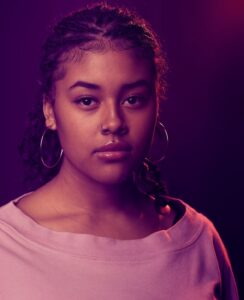
And then there’s their daughter, Natalie (Ella Claybrooks) who constantly has to put her own needs aside because her mother is still fixated on the death of her brother. She’s so used to being on the outside that she’s completely taken aback when Henry (Jayden Murphy), a boy at school, notices her and tells her that he’s noticed her for years. At one point, Natalie sings a song called “Superboy and the Invisible Girl,” in which she describes how her mother almost idolizes her dead brother while she is unseen in her own house. Diana’s gut-wrenching response to this is “you know I love you. I love you as much as I can.” After Diana attempts suicide, her doctor recommends ECT and gets consent from both Diana and Dan. This results in memory loss that’s so acute, Diana doesn’t remember her home, Natalie, her life with Dan, or Gabe. She appears to be doing better mentally until she begins to slowly recover her memories and has a breakdown as she experiences the pain of losing Gabe all over again. The play ends in a way that feels very real: there’s no clear resolution, but there is hope for the future. Although the family will never be normal, perhaps they will be something next to normal.
Diana is a difficult role to play as she really runs the gambit of emotions and mental states. Whitcomb-Oliva is phenomenal as her character leaps from mania, to anger, to sorrow, and finally to hope. The pain in her voice when she remembers Gabe’s death in the song “How Could I Ever Forget,” is nothing short of heartbreaking. Even my stoic husband shed a tear!

Dan is my favorite character, and Ledford III gave me goosebumps in some of his songs. After Diana’s suicide attempt, Dan is cleaning up the blood that she’s left on the ground and sings “I’ve Been,” a song about how hard he’s trying, how he doesn’t know how to help her, and how he doesn’t know how he could be alone. Ledford III’s voice is strong, and yet he has a beautiful fragility to his tone, as though he could break at any moment.
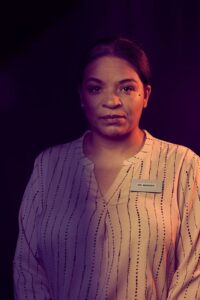
DaJuana Hammonds is perfectly cast as Dr. Madden. In the original script, this character is played by a man, but I quite liked that it is played by a woman in this production. The portrayal of this character can change how the audience is meant to view therapy and mental health professionals. Hammonds’ expressions and tone of voice are perfect for a Psychiatrist. She immediately gained my trust and respect. In fact, I liked her so much that I was shocked when she recommended ECT (although ECT is still practiced and has helped many people, it really does seem like a dismaying proposal at first). I would be fascinated to see how the whole play would change if this character was played with a cold and detached manner.
The characters Gabe, Natalie, and Henry, are all teenagers, but I was surprised at just how young the actors were; Walker (who plays Gabe) is a senior in high school. However, if I was worried how these young actors would stand-up to the more seasoned actors, I had nothing to worry about. Each one commands the stage in their own way. Walker is perfectly cast for Gabe, with a voice that is purely angelic. I loved the juxtaposition of his sweet voice along with the fact that every time he appears on stage, the actors are experiencing moments of extreme emotion or distress.
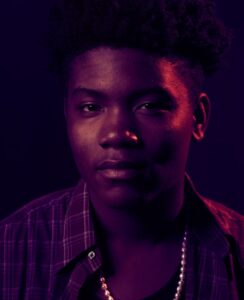
Murphy as Henry, the sincere and kind boyfriend, is positively overflowing with charisma. There were times when other characters would be speaking, but I would still be drawn to look at him instead. He delivers his lines in such a sweet and often humorous way, making the audience fall in love with him along with Natalie. Claybrooks has a very difficult job as an actor because Natalie is very angry with how she is treated and how her life has been (as Diana sings at one point “Your life has kind of sucked, I think”). An angry character can be difficult to relate to or to find likable. However, Claybrooks ability to be vulnerable in songs like “Superboy and the Invisible Girl” draws the audience in. A point of criticism I have about the blocking of this song is that Claybrooks is far away from the audience while Diana’s character is still in the foreground. While I’m sure this is an intentional way to help hammer home the idea that she is invisible, this is Natalie’s first and biggest moment to describe how she is feeling. I wish she had been front and center so we could experience her emotions along with her.

Despite that small criticism, the blocking is generally fantastic as they have very little space and almost no props. The costume design by Alexis Grigsby is quite well done. Dan primarily stays in his trousers and button-up shirt, while Diana’s outfits change with her mental state. At the end, when she has walked away from her doctor and then tells Dan that she is leaving him, she is dressed in bright, bold colors, showing her to be hopeful and strong.
The Street Theatre Company’s website describes this play as follows: “the story tackles the stigma surrounding mental health within the BIPOC/Black community and its impact on family dynamics.” I was interested to see how mental illness would be portrayed in the BIPOC community, and how the stigma differs from other communities. However, while the cast in this particular production is black, the play does not actually discuss race at all. I do appreciate the universality of this story and the knowledge that any person of any race can suffer from mental illness.
Next to Normal runs from September 6-21 and there is limited seating, so get your tickets now: https://www.streettheatrecompany.org/.
Songs of Resistance
Marc Ribot coming to Riverside Festival
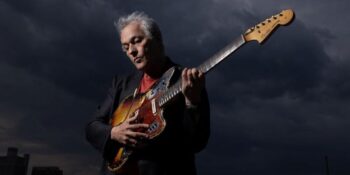
On Sunday, September 8th, renowned guitarist Marc Ribot will be appearing at the Riverside Revival in a duo performance featuring multi-instrumentalist Shahzad Ismaily and with special guest Buddy Miller. His appearance is part of a tour performing tracks from his 2018 release Songs of Resistance that have been “radically rearranged” plus “new material, improvisation, and whatever else reaps urgency.” Many of these tracks are blatantly and purposefully against Candidate Trump and the ideals of the Republican party. Importantly, Ribot’s work is politically and markedly informed by history.
For example, in 2018, famously reclusive Tom Waits leant his voice to Ribot’s version of “Bello Ciao” with an accompanying video featuring scenes of modern resistance. This song likely found its origins as a folk song in the rice fields of northern Italy where women of the lowest social class would carry out the extremely tiring work of caring for the young spring rice plants, spending the entire day in water two feet deep, barefoot, and bent over weeding the soil. The song, like the work, is purposefully slow, monotonous, gloomy and moving.
In the second half of the 20th century the song took on its modern shape and lyrics, embraced as a partisan hymn and dedicated to the partisans of the Italian resistance in World War Two. Since, the song has been recorded in nearly 50 different languages from Creole to Chinese, to Hungarian. Most recently, Mitski released a version on her youtube channel. As Mitski relates, the power of the song is in its direct, simple expression:
This is the flower of the partisanBella, ciao, bella, ciao, bella, ciaoThis is the flower of the partisanWho died for freedom.
This is just one of the selections from Songs of Resistance that Ribot will be performing on the 8th. Other tracks may include civil rights tunes, and other songs relevant the current political landscape but derived from history and tradition. Hopefully they’ll include, “Knock that Statue Down” (referring to recent events in Charlottesville) and “Rata de Dos Patas,” a Spanish denunciation of a certain politician and whose original singer’s name is withheld to avoid reprisals. If you agree with Ribot’s ideals, this concert promises to be politically inspiring, historically informative and emotionally stirring. Personally, I can’t wait. Tickets are still available here: https://www.riversiderevivalnashville.com/calendar/marc-ribot-songs-of-resistance-feat-shazad-ismaily-and-buddy-miller
Coming this Month:
Nashville Sonido Latino: September 2024

(Versión en español aquí)
GIOVANNI RODRÍGUEZ & 12 MANOS 
Rudy’s Jazz Room
Every Monday
9:00 PM
Tickets $19.44+
Social media: Instagram
Every Monday night at Rudy’s Jazz Room, the Caribbean sun comes alive with the vibrant beats of the congas. Giovanni Rodríguez, a versatile artist with Dominican roots now based in Nashville, leads this project alongside some of the city’s top musicians. The venue offers a dance floor for this event where you can move to the colorful rhythms of salsa, bachata, and Latin jazz.
TUMBAYÉ
Plaza Mariachi
Monday, September 2
7:30 – 9:00 PM
Saturday, September 14
5:30 – 7:00 PM
Free Entry
Social media: Instagram
Salsa, merengue, and bachata are just some of the rhythms you’ll enjoy with this vibrant group bursting with flavor. The voice of Tatiana Liary (Puerto Rico), known for her urban salsa style, paired with the unmistakable percussion of Manuel Manotas (Venezuela), creates an explosive combination that will have everyone dancing.
MARROCKO 
Plaza Mariachi
Friday, September 6
7:00 – 8:00 PM
Saturday, September 28
5:30 – 7:00 PM
Free Entry
Social media: Youtube Instagram Facebook
This duo from Cali, Colombia, brings a cutting-edge style that fuses Latin pop and rock with indie folk nuances. Guitarist and producer Alex Zúñiga, alongside vocalist Guile Gadel, infuse their compositions with the freshness of Spanish-language rock and contemporary lyrics. Their album “Mar de Rock” alternates between romantic and introspective themes. Marrocko has captivated Nashville audiences with performances at the Nashville Shores Waterpark Latino Fest 2023 and a high-energy guitar solo during a halftime show for Nashville, SC.
BRAZIL INDEPENDENCE DAY CELEBRATION
Plaza Mariachi
Saturday, September 7
12:00 – 8:00 PM
Free Entry
Celebrate Brazil’s Independence Day with a vibrant carnival of unique experiences. The event will feature a Brazilian market offering traditional food and crafts. Thea Danos and Alex Murphy, Will Barro Trio, Paulo Oliveira, Samba Fusion, and Alfredinho & Kids Characters will light up the stage with the country’s music and dance at this spectacular event.
ESLABÓN ARMADO
Toro Event Center
Saturday, September 7
8:00 PM
Tickets $60+
This Mexican-American group, specializing in regional Mexican music, began seven years ago when the Tovar brothers and Gabriel Hidalgo took an interest in studying and perfecting the sierreño and norteño styles. They gained popularity on social media platforms like YouTube and TikTok, eventually signing with DEL Records in 2020 and releasing hit singles like “Con Tus Besos” and “La Trokita.”
RITMO SABROSO
Plaza Mariachi
Saturday, September 7
8:30 – 10:00 PM
Free Entry
Social media: Facebook Youtube
True to their name, Ritmo Sabroso is a band that gets everyone on their feet, dancing to the beats of salsa, merengue, and cumbia. These genres have infused generations of celebrations in Latin America and beyond. This group brings together seasoned musicians from Venezuela, Colombia, Puerto Rico, and the United States, representing the rich cultural tapestry of these genres. This event is not to be missed for those seeking a tropical night out this weekend!
FIESTAS PATRIAS
Plaza Mariachi
Sunday, September 15
10:00 AM – 11:00 PM
Tickets: $15
The Independence celebrations continue, with Mexico hosting this time, joined by Guatemala, El Salvador, Honduras, Nicaragua, and Costa Rica, in a grand and unprecedented festivity. There will be three stages for musical performances, a reenactment of “El Grito,” and various local vendors offering a delightful array of Mexican and Central American flavors.
ALISON BRAZIL AND THE ROOTS OF RHYTHM
Looby Center Theater
Thursday, September 17
1:00 – 2:00 PM
Free Entry
Hailing from Louisiana, Alison Brazil has captivated international audiences in South America and Asia with her unique style of Louisiana Latin soul and deep, resonant voice. Her music is a blend of cultural influences and her global experiences. This time, she will perform at the Frank Dycus Legacy Senior Concert Series, sponsored by United Health Care and the Tennessee Arts Commission.
KARINA DAZA 
Geodis Park
Wednesday, September 18
6:00 PM
Tickets $26.55+
New York-born with Colombian roots, Karina Daza has embarked on an extraordinary musical journey, blending jazz, pop, Latin music, folk, and classical sounds. Her English and Spanish lyrics reflect a rich tapestry of experiences from her warm childhood to conquering new territories in the U.S. and beyond. Karina will open the Nashville SC vs. Chicago Fire FC match with her musical performance.
DOS PRIMOS DE CUIDADO
Plaza Mariachi
Friday, September 20
8:00 PM
Tickets $80+
El Flaco and El Mimoso will go head-to-head in a regional Mexican music showdown that promises to be an exciting and entertaining spectacle. Luis Ángel and Luis Antonio López have built their solid careers with their authentic banda style. Songs like “El Que Te Amó,” “Hasta La Miel Amarga,” and “En Esta Vida No Se Pudo” have propelled them to massive success among Mexican and U.S. audiences.
BLUE ASHES DUO 
Plaza Mariachi
Saturday, September 21
4:30 – 5:15 PM
Free Entry
This duo from Colombia and Denmark combines hard rock and rockabilly rhythms with a cutting-edge style. Guitarist Alex Zúñiga and vocalist Shila Mariposa bring their signature flair to classic rock covers and their original compositions, featured in their album “Checkmate.”
TWANGUERO
Analog at Hutton Hotel
Wednesday, September 25
6:30 – 11:30 PM
Tickets $19.02+
Diego García “Twanguero” is a celebrated Spanish guitarist whose versatility and mastery have captivated audiences worldwide. His style blends Spanish classical guitar, Latin rhythms, country, rockabilly, jazz, and even surf music. Diego has been able to accompany renowned artists from the Latin American and Spanish music scenes for over three decades.
STEPHANIE URBINA JONES 
Grand Ole Opry House
Friday, September 27
7:00 PM
Tickets $53+
Stephanie has embarked on a journey to reconnect with her Mexican roots, paying tribute through her unique “Honky Tonk Mariachi” style. Born in El Paso, TX, and now based in Nashville, she has shared the stage with artists like Willie Nelson and became the first performer to bring mariachi music to the Grand Ole Opry.
LOS TIGRES DEL NORTE 
Bridgestone Arena
Friday, September 27
8:30 PM
Tickets $76.48+
The iconic Mexican regional band, known for pioneering the “narcocorrido” genre, will make their next tour stop in Music City. Their exceptional career has earned them six Grammy Awards and twelve Latin Grammy Awards, attracting audiences from five continents and participating in over 40 films. With 30 million records sold, Los Tigres del Norte has become an international symbol of the rich music from Northern Mexico.
ROLAND BARBER: CELEBRATING THE SPANISH TINGE!
Nashville Jazz Workshop
Saturday, September 28
7:30 PM
Tickets $38.16
Nashville native trombonist Roland Barber has captivated the jazz scene with his exquisite blend of South American and Caribbean rhythms. For Roland, it’s essential to push the boundaries of jazz by incorporating the vibrant sounds and rhythms that embody Hispanic culture. His successful career has seen him share the stage with Wynton Marsalis and perform with the Duke Ellington, Arturo O’Farrill, and the Spanish Harlem orchestras.
CAMILA MEZA
Ascend Amphitheater
Monday, September 30
8:00 PM
Tickets $54.35+
Chilean singer and guitarist Camila Meza has taken the New York jazz scene by storm with her musical fusion of South American rhythms and American popular song. Her exceptional talent has led her to perform in iconic jazz venues like The Village Vanguard, Jazz Standard, and Duc de Lombards (Paris). Her extensive U.S. tour will stop in Nashville, where she will share the stage with Arab singer Arooj Aftab.


